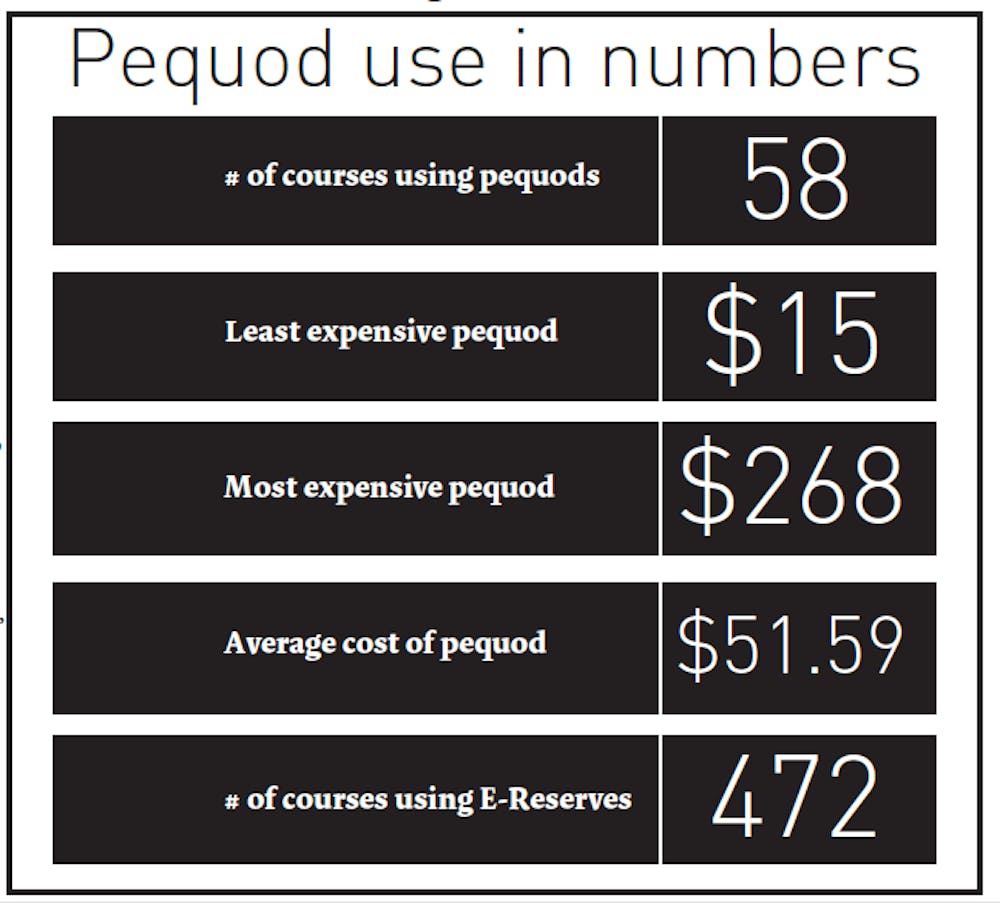When it comes to preparing course packets for their courses, professors generally have two options: ask the University library to upload electronic course reserves or prepare a hard-copy packet printed by Pequod Communications.
But it is the Pequod, which is expensed to the student, which carries controversy. In interviews, professors expressed mixed opinions. While the lack of cost for students of electronic course reserves -- also known as e-reserves -- appeals to some, others prefer hard-copy course packets printed by Pequod.
Pequod, which is run by University alumni James Robertson ’91 and Andre Liu ’91, is the primary distributor of course packets on campus, as well as the primary binder of senior theses.
Fifty-eight courses used course packets from Pequod this fall, according to a Daily Princetonian review of the registrar's website. The prices of the packets varied between $15, in the case of KOR 301: Advanced Korean I, and $268, in the case of NES 323: Introduction to Early Sufism. The average cost for a course packet was $51.59.
Robertson explained that the cost of a course packet is generally determined by the production cost and how much in copyright royalties the company has to pay for the packet. He said that for every course packet, roughly two-thirds of its cost is used to pay for copyright royalties.
Meanwhile, a total of 472 courses used the e-reserve service during the 2013-14 academic year, according to Library Circulations Services Director Peter Bae. Bae added that during the same year, Library Circulations Services used over $14,000 for copyright royalty, all of which have been covered by library budget. When a professor uses the e-reserves, the costs are assumed by the University and no costs are passed on to the student.
Under the “fair use” exemption, the University is eligible to use up to 10 percent of the original material without copyright royalty for strictly educational reasons. If the material requested by a professor is longer than 10 percent of the original material, the Reserve/General Periodicals Services will consult the Copyright Clearance Center and pay the copyright royalty, Bae said.

Bae noted that there is not much restriction on the use of materials, except that the material has to be deleted from Blackboard at the end of each semester and the University must legally possess a copy of the original material. However, Bae added that if the University does not have the requested material, it will simply buy it.
History professor Sheldon Garon said that he prefers Pequod packets to e-reserves because he wants to make sure that students bring their readings to class. Garon is teaching HIS 322: 20th-Century Japan.
“We do a lot of document-based close readings in my courses,” Garon said, noting that students don’t always print out the material. “If they didn’t print it out on a piece of paper, the alternative is to bring their laptops and iPads in — and they get distracted.”
Garon added that he is aware that course packets can be expensive, so he tries to keep the price low by making his packet thin.

However, the high price of the packets is a concern for some professors who decided to stop using course packets and use e-reserves and the course material upload system on Blackboard instead.
French lecturer Christine Sagnier, who has used course packets for many years, said she and other professors in her department are in the process of shifting away from using course packets because the price has increased so much over the past few years.
Sagnier explained that the reason she and her colleagues originally used course packets was to lower prices for students, since language textbooks are often expensive.
“At one point, it was a good solution, better than a really expensive textbook, because the textbooks were really costly,” she said. “The whole point was that it should have been cheap for the students, but [the cost] is almost like a textbook now.”
Sagnier said she didn’t realize how expensive the packet had gotten until this year.
“It used to be something like $30. And then I asked my students at the beginning of the year [about the price] and they told me [it was] $70,” Sagnier said. “We don’t have any royalties on this, so we were shocked to find that they were so expensive.”
However, Robertson said he believes the price has stayed roughly the same for the last 10 years.
“We have not raised the price of course packets in more than a decade ... There’s no change in pricing on our end,” Robertson said, adding that if some people see an increase in the price, it might be because some publishers who hold copyright over the material decided to increase the copyright royalty.
“The digitization of the [academic publishing industry] has created this feeling that, 'It’s just a stack of paper; there’s no value.' " Robertson said, in regard to the critique that the course packets are too expensive. "To some degree, the academic publishing has been often beat up so badly by the dawn of the Internet age. Anything that values and contributes to support the ethically academic publishing, personally I think it’s a good thing"








